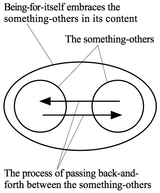Search Results
6/22/2025, 4:12:05 AM
>prayer
Fair lady from wilds of new
From wasp and orchid, childs of two -
Natures come / absorb the other
Have us hover ‘mid / likeness robbed
(For thief is unhid / sameness lost)
And hear sobs of bees,
The buzzing of trees,
Cells to cells / blustering as me’s
>enannah vs hidweh
next is dialectics which is here understood in its more destructive aspects as a labour of negativity. as ralph says, you want to keep questioning something until you do not need to question anymore. this is reminiscent with heidegger’s “destruktion” (which later influenced derrida’s “deconstruction) and of course a but of hegel. of course the latter also incorporated sublation in all of this so that often concepts may end up vanishing into some larger concept
hegel presents another point of comparison. in the phenomenology, he ultimately tries to bring together two different dichotomies. the first is between the the implicit (in-itself) and explicit (for-itself). here we have the unreflective activity of cultures prior to the rise of philosophy and the behaviour of animals vs a more conscious understanding of where we are in the world and where to move forward from here. hidweh embodies this in the her connection to the idea of the “flesh made word”. on face value it is just an inversion of christian doctrine, but it is also about the bringing of these abyssal biological processes into consciousness so they may be worked with productively instead of being treated as fate
on the other hand we have the dichotomy between self-interest (for-self) and altruism (for-others). something hegel notes is that individual activities are already always social. they always get related to the larger social fabric when brought into the light of day. hence the individual is always connected to an other. this opening to otherness is something that starts early on and is not something that starts with man
Fair lady from wilds of new
From wasp and orchid, childs of two -
Natures come / absorb the other
Have us hover ‘mid / likeness robbed
(For thief is unhid / sameness lost)
And hear sobs of bees,
The buzzing of trees,
Cells to cells / blustering as me’s
>enannah vs hidweh
next is dialectics which is here understood in its more destructive aspects as a labour of negativity. as ralph says, you want to keep questioning something until you do not need to question anymore. this is reminiscent with heidegger’s “destruktion” (which later influenced derrida’s “deconstruction) and of course a but of hegel. of course the latter also incorporated sublation in all of this so that often concepts may end up vanishing into some larger concept
hegel presents another point of comparison. in the phenomenology, he ultimately tries to bring together two different dichotomies. the first is between the the implicit (in-itself) and explicit (for-itself). here we have the unreflective activity of cultures prior to the rise of philosophy and the behaviour of animals vs a more conscious understanding of where we are in the world and where to move forward from here. hidweh embodies this in the her connection to the idea of the “flesh made word”. on face value it is just an inversion of christian doctrine, but it is also about the bringing of these abyssal biological processes into consciousness so they may be worked with productively instead of being treated as fate
on the other hand we have the dichotomy between self-interest (for-self) and altruism (for-others). something hegel notes is that individual activities are already always social. they always get related to the larger social fabric when brought into the light of day. hence the individual is always connected to an other. this opening to otherness is something that starts early on and is not something that starts with man
Page 1
